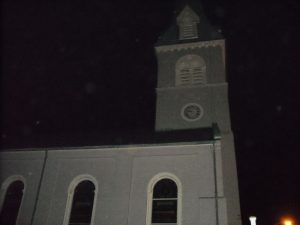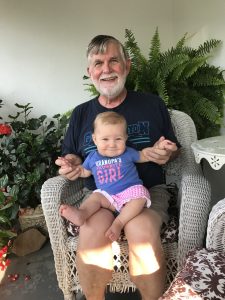1 Kings 17:1
Now Elijah the Tishbite, from Tishbe in Gilead, said to Ahab, “As the Lord, the God of Israel, lives, whom I serve, there will be neither dew nor rain in the next few years except at my word” (NIV).
We have looked at Israel’s horrible spiritual condition, and the way the Lord responded to it by sending a prophet, Elijah, who would point the people back to God. We have seen that Elijah was fully convinced of the Lord’s existence and power to bring about change. That was a crucial starting point. Two other qualities were necessary for an effective ministry in a very troubled time.
Elijah was conscious of being God’s messenger. He knew his position in God’s work. This helped in two ways:
- It kept him focused on the work at hand. He did not have to bother with building his own little kingdom, but the kingdom of God. The apostle is another example of this kingdom focus. But on some points I have written to you very boldly by way of reminder, because of the grace given me by God to be a minister of Christ Jesus to the Gentiles in the priestly service of the gospel of God, so that the offering of the Gentiles may be acceptable, sanctified by the Holy Spirit (Romans 15:15-16 ESV).
- It directed him to live for the one who would judge his work, and not to be concerned with what people thought. We must see ourselves as God’s servants. To use a common illustration, we serve for “an audience of one.” This must be kept within the boundaries that Scripture sets for our actions. No one has the right to pretend, “I am God’s servant and can do whatever I desire.” Such an attitude reveals a heart in which one’s own desires and God’s written will are in conflict. We speak of boldness to do exactly what God desires.
Elijah knew his authority. He spoke and acted for God, as God’s prophet. He had a mission that the Lord wanted him to do. He was compelled to do it, like Jeremiah was. For whenever I speak, I cry out, I shout, “Violence and destruction!” For the word of the Lord has become for me a reproach and derision all day long. If I say, “I will not mention him, or speak any more in his name,” there is in my heart as it were a burning fire shut up in my bones, and I am weary with holding it in, and I cannot (Jeremiah 20:8-9 ESV). This sense of authority encouraged him to act boldly. He had the courage to personally confront Ahab with his message. He had the courage to announce a great judgment. Consider how unpopular the doctrine of hell is today, even in supposedly evangelical churches. And not only is the Biblical teaching about hell despised, but also the reality of sin. If you attend a so-called church where sin, condemnation, and God’s wrath are not preached and believed, you are not in a church but a religious social club. Leave it.
Elijah was confident of God’s faithfulness. His confidence was Bible-based. Be careful that you are not enticed to turn aside, serve, and bow in worship to other gods. Then the Lord’s anger will burn against you. He will shut the sky, and there will be no rain; the land will not yield its produce, and you will perish quickly from the good land the Lord is giving you (Deuteronomy (11:16-17 CSB). The world cannot understand the godly man or woman because it does not share its view of God’s word as truth. Elijah did, he took God’s word seriously. He knew that God meant what he said. He also was confident that God would judge sin. Elijah’s prayer to withhold rain and dew from the land must be seen in this light. It had its foundation in the “curses of the law covenant” (cf. Deuteronomy 28:15-68).
For this reason, Elijah prayed in conformity with God’s revealed word. Making requests in true prayer involves having faith to claim the promises in the word of God, and then asking him to do as he has said. This was the motivation behind his fervent prayer (James 5:17.)
Pink in his writings about Elijah made the following three points:
- “He prayed because he was assured that the Lord God lived and ruled over all.”
- “He prayed because he realized that God is almighty and that with Him all things are possible.”
- “He prayed because he felt his own weakness and insufficiency and therefore turned to One who is clothed with might and is infinitely self-sufficient.”
Do we have the same world view that Elijah had? Do we pray like Elijah did? Say what you want, but Christians no longer gather to pray because God is not in control in their world and life view. May we pray together as the early church and the church in times of revival prayed!
Grace and peace, David

 Jonah 1:5-10
Jonah 1:5-10 Psalm 18:4-6
Psalm 18:4-6 Colossians 1:29
Colossians 1:29 Acts 4:29-31
Acts 4:29-31 Acts 4:23-31
Acts 4:23-31 2 Timothy 2:22
2 Timothy 2:22 Genesis 50:15-21
Genesis 50:15-21 When we were overwhelmed by sins, you forgave our transgressions. Blessed are those you choose and bring near to live in your courts! We are filled with the good things of your house, of your holy temple. You answer us with awesome and righteous deeds, God our Savior, the hope of all the ends of the earth and of the farthest seas, who formed the mountains by your power, having armed yourself with strength… (Psalm 65:3-6 NIV)
When we were overwhelmed by sins, you forgave our transgressions. Blessed are those you choose and bring near to live in your courts! We are filled with the good things of your house, of your holy temple. You answer us with awesome and righteous deeds, God our Savior, the hope of all the ends of the earth and of the farthest seas, who formed the mountains by your power, having armed yourself with strength… (Psalm 65:3-6 NIV) Acts 10:37-38
Acts 10:37-38